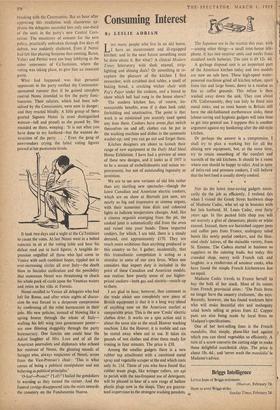Consuming Interest
By LESLIE ADRIAN LIKE many people who live in an old home, I have an inconvenient and ill-equipped kitchen; and in the near future something must be done about it. But what? A clinical Modern Times laboratory with sleek enamel, strip-
lighting and shining dials? Or something to re- capture the pleasure of the kitchen I first remember, with scrubbed deal tables, a smell of baking bread, a creaking wicker chair with
Peg's Paper under the cushion, and a board to show which bell had rung in the house above? The modern kitchen has, of course, im- measurable benefits, even if it does look cold,
forbidding and unattractive. The point is that work is so minimised you scarcely need spend any time there. Cookers have ovens _that switch themselves on and off; clothes can be put in
the washing machine and dishes in the automatic washer-up; and you can go out and forget them. Kitchen designers are about to launch their range of new equipment at the Daily Mail Ideal
Home Exhibition. I have had a preview of some of these new designs, and it looks as if 1957 is to be a season of embellishments and minor im- provements, but not of outstanding ingenuity or invention.
We are to see new versions of old hits rather than any startling new spectacles—though the latest Canadian and American electric cookers, which are on show at Harrods just now, are nearly as big and impressive as cinema organs, with their numerous time dials and coloured lights to indicate temperature changes. And, like a cinema organist emerging from the pit, the cooked joint is automatically slid from the oven and raised into your hands. These imported cookers, for which, I am told, there is a steady demand, cost approximately £170. They are much more ambitious than anything produced in this country so far. I gather, incidentally, that this transatlantic competition is acting as a stimulus to some of our own firms. When one considers that import duty is included in the price of these Canadian and American models, one realises how poorly some of our higher- priced cookers—both gas and electric—match up to them.
I am glad to hear, however, that comment in the trade about one completely new piece of British equipment is that it is a long way ahead of anything now on the American market at comparable price. This is the new `Creda' electric clothes drier. It works on a spin action and is about the same size as the small Hoover washing machine. Like the Hoover, it is mobile and can be stored away when not in use. It takes six pounds of wet clothes and dries them ready for ironing in four minutes. The price is £38.
Among the smaller gadgets there is a new rubber tap attachment with a combined metal spray and vegetable scraper at the end which costs only 9s. 11d. Those of you who have found that rubber waste plugs, like wringer rollers, are apt to perish with the too-frequent use of detergents, will be pleased to hear of a new range of hollow plastic plugs now in the shops. They are guaran- teed impervious to the strongest washing powders. The Japanese are in the market this year, with —among other things—a small inter-house tele- phone. It has two receiver units and works from standard torch batteries. The cost is £9 12s. 6d.
A garbage disposal unit is an important part of the American kitchen today and two models are now on sale here. These high-speed water- powered machines grind all kitchen refuse, apart from tins and large bones, down to a residue as fine as coffee grounds. This refuse is then washed away down the sink. They cost about £50. Unfortunately, they can only be fitted into metal sinks; and as most homes in Britain still have the old-fashioned earthenware sinks, these labour-saving and hygienic gadgets will take time to get into general use. I suppose this is another argument against my hankering after the old-style kitchen.
Or perhaps the answer is a compromise. I shall try to plan a working bay for all the shining new equipment, but, at the same time, try to retain something of the comfort and warmth of the old kitchens. It should be a room where one should be happy to relax. And in spite, of infra-red and pressure cookers, I still believe that the best food is usually slowly cooked.
Nor do the latest time-saving gadgets neces- sarily do the job as efficiently. 1 realised this when I visited the Greek Street hardware shop of Madame Cadec, who set up in business with her late husband, M. Louis Cadec, over forty years ago. In this packed little shop you will see scarcely a glint of chromium, plastic or white enamel. Instead, there are burnished copper pans and coffee pots from France, mahogany salad bowls like newly peeled conkers, and the blue- steel chefs' knives, of the stainable variety, from St. Etienne. The Cadecs started in business as suppliers to the catering trade, but today this crowded shop, merry with French talk and laughter, is a rendezvous of amateur cooks, who have found the simple French kitchenware has no equal.
Madame Cadec travels to France herself to buy the bulk of her stock. Most of its comes from French provincial cities : 'The Paris firms no longer have the country craftsmen,' she says. Recently, however, she has found workmen here who will make beautiful elm and mahogany salad bowls selling at prices from £2. Copper pans are also being made by local firms to Madame's specifications.
One of her best-selling lines is the French mandolin, that simple, plane-like tool against which you can shred vegetables so efficiently. A turn of a screw converts the cutting edge to make those delightful matchstick chips. The price is about 18s. 6d.; and 'never wash the mandolin' is Madame's advice.


































 Previous page
Previous page